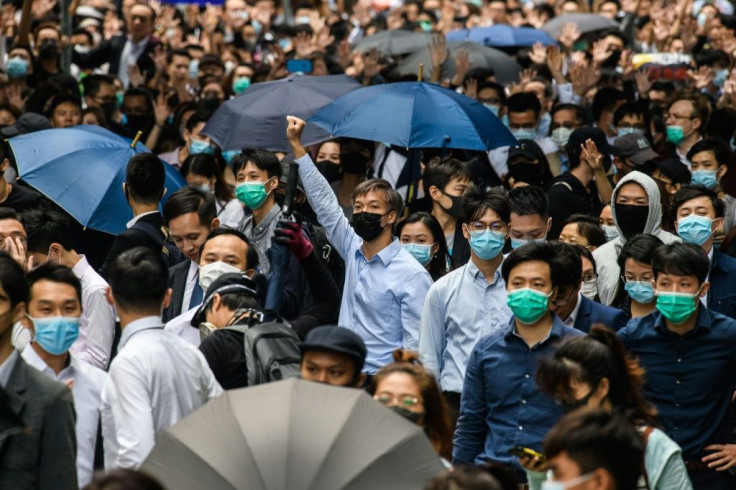Hong Kong's Economy Contracts For Second Straight Quarter, Signaling Recession As Anti-Government Street Protests Continue

Amid a swirl of continuing anti-government protests, Hong Kong confirmed the city has entered into a recession for the first time in a decade.
For the July-to-September period, gross domestic product fell by 3.2% over the prior quarter, which also posted negative growth – two consecutive quarters of contraction signals a recession. The economy has shrunk 2.9% in the past 12 months.
For the full fiscal year, the Hong Kong government expects the economy to fall by 1.3%. Prior to the June protests, Hong Kong’s government officials had forecast economic growth of 2% to 3% this year.
The government blamed the economic weakness and worsening domestic demand on the ongoing protests, which it termed “local social incidents.” Hong Kong officials also said the conflicts “took a heavy toll on consumption-related activities and subdued economic prospects weighed on consumption and investment sentiment.”
The government’s statement further called for "ending violence and restoring calm” as a pivotal means of restoring the economy. “The government will continue to closely monitor the situation and introduce measures as necessary," it added.
The protests, which began in June over a now-withdrawn bill that would have let suspects be extradited to mainland China, have now metamorphosed into action against the police and over Beijing’s administration over the city.
Two major companies, fashion house Burberry Group (BURBY) and Cathay Pacific (CPCAY) have attributed recent performance issues to the disruptions posed by the protests.
Cathay Pacific forecast its second-half earnings would be significantly below its first half figures, citing a 35% decline in the number of October travelers arriving in Hong Kong.
Aside from the violence, tourism to Hong Kong has fallen and local retail stores have reported a drop in sales. Overall, local retail sales in September dropped 18.3%, following a 23% plunge in August.
China’s stalled trade deal with the U.S. has also weighed on Hong Kong’s economy.
Reuters reported analysts warn that with no end in sight to the protests, Hong Kong faces a longer and worse economic malaise than what it endured during the global recession of 2008-09 or the SARS epidemic in 2003.
However, Hong Kong received a confidence boost after Chinese e-commerce giant Alibaba (BABA) announced plans to raise up to $13 billion in a public offering in Hong Kong.
Alibaba chairman and CEO Daniel Zhang wrote a letter on Friday which stated: "During this time of ongoing change, we continue to believe that the future of Hong Kong remains bright. We hope we can contribute, in our small way, and participate in the future of Hong Kong."
© Copyright IBTimes 2024. All rights reserved.





















